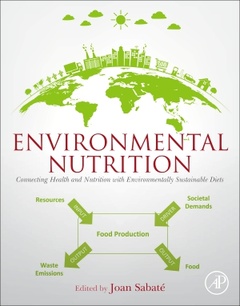Environmental Nutrition Connecting Health and Nutrition with Environmentally Sustainable Diets
Coordonnateur : Sabate Joan

Environmental Nutrition: Connecting Health and Nutrition with Environmentally Sustainable Diets explores the connection between diet, environmental sustainability and human health. Current food systems are a major contributor to our most pressing health and environmental issues, including climate change, water scarcity, food insecurity and chronic diseases. This book not only seeks to increase our understanding of the interrelatedness of these major global issues, but also aids in the creation of new solutions. Sections discuss the diet, the health and environment trilemma, food systems and their trends, environmental nutrition as an all-encompassing discipline, and the environmental nutrition model.
Section 1: Introduction 1. The diet, health and environment trilemma 2. Food systems: description and trends 3. Environmental nutrition as an all-encompassing discipline 4. The Environmental Nutrition Model
Section 2: Global Challenges for Environmental Nutrition 5. Resource inefficiencies in the food system 6. Unsustainable societal demands on the food system 7. Food and dietary patterns 8. Environmental degradation – an undesirable output of the food system 9. Impacts of the food system on Earth’s environmental boundaries 10. The ethical imperative for Environmental Nutrition
Section 3: Tools and Approaches 11. Food Life Cycle Assessment 12. Methodological approaches for assessing diet, environmental sustainability and human health
Section 4: Defining Healthy and Sustainable Diets and Their Potential to Address Environmental Nutrition Challenges 13. Determinants of sustainable diets 14. Can diets be both healthy and sustainable? 15. Alternatives to meat: high protein plant products 16. Healthy and sustainable diets as climate change mitigation strategies 17. Food policy – where does environmental nutrition fit in? 18. Healthy and sustainable diets for a food secure future 19. Feeding healthy food to a growing population within Earth’s biogeophysical limits
Food scientists, food, nutrition, agricultural, and environmental researchers, environmental health professionals, those interested in food policy, and academics who teach graduate courses on this topic
Dr. Sabaté served as principal investigator in a nutrition research study that directly linked the consumption of walnuts to significant reductions in serum cholesterol. His findings were published in the New England Journal of Medicine in 1993 and received the attention of more than 400 media sources, both national and international. Bringing the research full circle Archives of Internal Medicine has recently published the findings of his pooled analysis of 25 intervention trials establishing the benefits of nut consumption on blood lipid levels and lowering the risk of heart disease. Dr. Sabaté continues to research the relationship of almonds, pecans, and walnuts to heart disease risk factors. He has served as a co-investigator of the Adventist Health Study, a cohort study of nearly 60,000 Seventh-day Adventists and the relationships between their diets and various diseases and is currently a co-investigator of the Adventist Health Study-2, which enrolled 96,000 Seventh-day Adventists.
- Demonstrates how the food system, the environment and human health are inter-related
- Explores how dietary patterns impact food production and agriculture choices
- Identifies the imbalance between current food production relative to demand
- Addresses how the current food system negatively impacts the environment
- Provides practical solutions to how diets can be both healthy and sustainable
Date de parution : 07-2019
Ouvrage de 354 p.
15x22.8 cm



